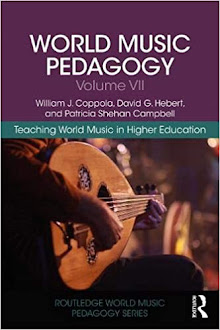
Back to the USA . . . I have been offered a new position in the
United States as Associate Professor with the
School of
Music,
University of Southern Mississippi. My job will be leading the school’s
PhD program and teaching graduate research methods seminars and other courses. USM is a state funded institution located about 80 minutes north of
New Orleans that has a strong history for music programs (including winds, jazz, and music industry studies), is nationally designated as a research-extensive university, and has a tenure (permanent employment) system. The
School of
Music at
University of Southern Mississippi is the only doctoral-degree granting music school in the state, and the university is considered a leading research institution of the Gulf South region. In this position I will also plan development of a
unique research center to support the music education PhD program, focused on the theme of originality in music, including globally-significant genres that first originated in the southern
Mississippi region, such as blues, jazz, and rock and roll.
MISSISSIPPI is actually a very important place for music, as the source of innovative performers that have forged new styles and made a substantial impact on music in much of the world. Musicians from Mississippi include leading blues performers Muddy Waters, Robert Johnson, Bo Diddley, W. C. Handy, Howling Wolf, John Lee Hooker and B.B. King, pioneers of rock and roll Jerry Lee Lewis and Elvis Presley, jazz legends Lester Young, Hank Jones, and Gerald Wilson, contemporary jazz masters Tom Malone, Mulgrew Miller, Mose Allison, and Cassandra Wilson, pioneers of country music Jimmie Rodgers and Charley Pride, renowned songwriters like Jimmy Buffett, and even revered art music composers such as William Grant Still and Milton Babbitt.
University of Southern Mississippi is ideally situated - in the original heartland of American musical innovation - for studies of American music traditions that will be of interest to musicians and educators in other parts of the USA and the rest of the world. For anyone interested in the roots of blues, jazz, or rock, this is a perfect setting for research.
Recently, Mississippi also seems ripe for new initiatives in the areas of educational and cultural policy that could be supported by music education research. For decades, the state has experienced economic and educational challenges, with the highest percentage of people living below the poverty line in the USA and low ratings for basic educational achievement. Music education research studies may help to turn this situation around by developing more effective ways of capitalizing on the rich and unique cultural heritage of this area, which has impacted much of the world through music. Research in music education may also inform the development of innovative, culturally relevant forms of education that motivate students for higher levels of academic achievement.
Hopefully the experiences of developing intercultural music programs in Europe, indigenous/minority music education in New Zealand, community music in Japan, and online doctoral education in Boston may aid as I work with others to envision some new possibilities for music education in Mississippi, as well as opportunities for effectively sharing the important musical achievements from Mississippi with the rest of the world. USM has outstanding facilities, and will be an excellent place to host conferences and symposia on such topics as music education, sociology of music, popular music pedagogy, American music studies and ethnomusicology.
This is an exciting new opportunity and I am eager to work with the students and world-class music faculty at University of Southern Mississippi.




















No comments:
Post a Comment